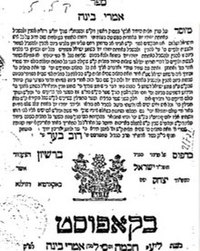 Imrei Binah, Kapust edition | |
| Author | Rabbi Dovber Schneuri, the second Chabad Rebbe |
|---|---|
| Published | Kehot Publication Society |
| Pages | 486 (Hardcover edition) [1] |
| ISBN | 978-0826654991 |
 |
| Part of a series on |
| Chabad |
|---|
| Rebbes |
|
| Places and landmarks |
| Holidays |
| Organizations |
| Schools |
| Texts |
| Practices and concepts |
| Chabad offshoots |
Imrei Binah is a work by Rabbi Dovber Schneuri, the second Rebbe of the Chabad Hasidic movement. Imrei Binah is considered to be one of the most profound texts in Chabad philosophy. [2] [3] [4]
Contents
The central themes discussed in Imrei Binah are the Hasidic explanations for the commandment of the reading the Shema and donning the Tefillin. [5]